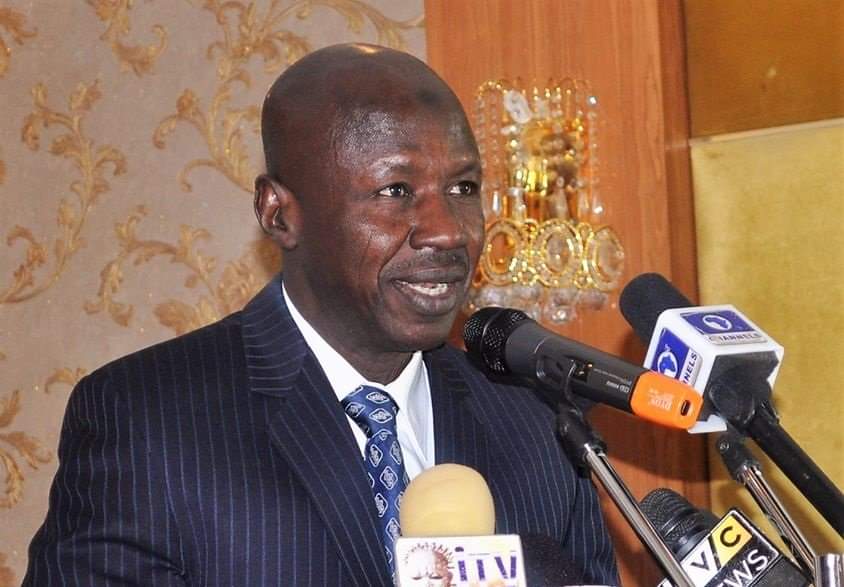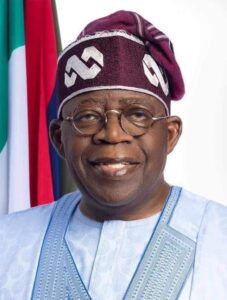
IT is a grand irony that those responsible for the ongoing travails of the Acting National Chairman of the Economic and Financial Crimes Commission (EFCC), Mr. Ibrahim Magu, have sought to justify his current investigations for alleged corrupt activities with reference to the need to demonstrate to the people that no public officer in the Buhari administration, no matter how highly placed, is above the law. They may have a point there. For the anti-corruption points- man himself to become a subject of critical probe by security agencies for alleged financial infractions, it must mean that the administration takes its war against graft very seriously indeed.
But then, can the man reportedly behind the myriad allegations against Magu, namely, the Attorney General of the Federation (AGF) and Minister of Justice, Mr. Abubakar Malami, contend credibly that in his over two score list of alleged misdeeds against Magu, he has come to equity with clean hands and that he has no hidden scores to settle with the former EFCC Czar? It is a difficult question to answer.
The office of AGF is perhaps the most sensitive and critical that anyone can occupy particularly in an administration like that of President Muhammadu Buhari, which proclaims from the rooftops its determination to fight corruption and raise ethical standards in the country’s public life. Make no mistake about it, the administration scores above average marks in its endeavors in this regard. However, it could have recorded greater successes and scored exceptionally higher in its anti corruption rating but for some of the methodologies or lack of it employed in seeking to achieve its anti-graft objectives.
First, let us even talk about the suitability of the administration’s methods employed in its anti-corruption war. There does not appear to be any scientific, overarching methodology that underlies its war against corruption. Thus, the administration ends up scoring own goals against itself and in reinforcing the perception internally and globally that the country is one irredeemable cesspit of corruption. Very early in the life of the Buhari presidency, in July, 2016, the security agencies raided the houses of judges in Abuja, Port Harcourt, Gombe, Kano, Enugu and Sokoto in the dead of night, arrested a number of them and charged some to court for alleged financial infractions. The move was described as a ‘sting operation’ in which a number of the jurists were discovered to have huge and indefensible amounts of cash in their residences.
I am not sure that but for one or two cases who were forced to retire prematurely, the damage done both to the judiciary and the country’s image on that occasion does not far outweigh the gains of an exercise that could have been handled with far greater tact, intelligence and strategic sense.
At about the time that the houses of the judicial officers were being raided in Nigeria and the entire judiciary was being wholly denigrated and humiliated, we are told that Ghana was also fighting corruption in its judiciary with more than two dozen corrupt judicial officers either dismissed or prosecuted. But that was done in a sober and mature way that did not discredit the entire judiciary as a whole or drag the country’s name into needless obloquy.
It appears to me that the handling of the Magu case, both in terms of the allegations against him and the way the case has been handled, illustrates the dysfunctional turf wars that have characterized the Buhari presidency and given the impression of an administration that is perennially at war with many of its highest placed officers undermining each other and engaging in needless internecine battles. There is no doubt that one of Malami’s grouses against the former (?) EFCC Acting Chairman is the latter’s perceived refusal to totally subordinate his agency to the AGF’s control. Here I think the fault lies entirely with the presidency. If Malami was right, Magu should simply have been told to strictly report to and carry out the instructions of the Attorney General in discharging his duties.
Thus, the AGF accuses Magu of insubordination to the office of the Minister and not seeking his approval on some decisions as well as reporting some judges to their bosses without reference to the AGF. Of course, there are also very serious allegations against Magu such as alleged discrepancies in the reconciliation of records of the EFCC and the Federal Ministry of Finance on recovered funds, declaration of N539 billion as recovered funds instead of the N504 billion earlier claimed, not respecting a court order to unfreeze N7 billion judgment in favour of a former Executive Director of a Bank, alleged sale of seized assets to cronies, associates and friends and not providing enough evidence for the extradition of former petroleum Minister, Mrs. Diezani Allison-Madueke.
Some of these allegations are in my view the fault or lapses of the security and intelligence community as a whole rather than that of only one agency like the EFCC. An example is the alleged late legal action on Process &Industrial Development (P&ID), a company that sued Nigeria for $6.6 billion in 2017 for alleged breach of contract. The security agencies should have acted in concert with the office of the AGF in nipping this problem in the bud before it became such a big public relations mess for the country.
Again, can Malami credibly question Magu’s purported non-respect for court orders when he himself has not set a stellar example in that regard? But then, if Magu had firm directives from the AGF to carry out any court directive, he certainly has no excuse ignoring or disobeying such an order.
Again, in the way he has operated as AGF, Malami himself, no matter how well meaning he may be, has courted too much controversy that may raise doubts about his intentions. For instance, in his handling of the ongoing case of the alleged crime kingpin from Taraba State, Bala Hamisu, also known as Wadume, Malami has raised doubts in the minds of many Nigerians. In withdrawing the case file from the police and bringing the case directly under the purview of his ministry, the AGF inexplicably dropped from the charge sheet, the names of ten soldiers alleged to be accomplices to the crime and who killed three senior police officers while also illegally rescuing Wadume from the custody of the slain policemen.
Reacting to the public outcry that greeted this decision, Malami’s argument was that the military officers responsible for the murder first had to undergo internal military processes of the military through court martial before they could be charged before civil courts. The question is how long will this process take for a crime that was committed last year and for which the relevant military authorities have been so obviously reluctant to release their men to face the law? The earlier the AGF makes sure the military officers are brought before the courts to prove their innocence, the more public confidence will be restored in his office.
We can also recall the case involving the pension reforms chief, Abdul-Rasheed Maina, who was a fugitive from the law for alleged embezzlement of pensions’ funds running into billions of Naira. Maina was illegally absorbed back into office allegedly on the legal advice of Malami. It took a presidential directive by PMB for that decision to be rescinded and for Maina to be brought before the law as is currently happening. Malami’s saving grace here is that he has at least not interfered with the ongoing process of Maina’s trial as he has the powers to do.
It is instructive that virtually all Magu’s predecessors at the EFCC have had similar allegations of corruption hurled at them, which they vehemently denied and still do. If those at the vanguard of the country’s anti-corruption war can be so easily and cavalierly tainted by charges of graft, then the country still has a long way to go towards achieving higher ethical standards in her public life. If Magu has his reputation credibly damaged by the ongoing investigation, we can only pray that the Buhari administration’s anti-corruption war may not have come to a pitiable dead end.
For whatever may be his faults, Magu has demonstrated immense courage in the discharge of his duties even if he is no saint. The heartwarming fact in all this is that the investigative, administrative panel is headed by a jurist of the caliber of Justice Ayo Salami, a retired President of the Court of Appeal with reputation for courage and integrity. If Magu is truly innocent of the charges, he is likely to receive justice before the panel.












